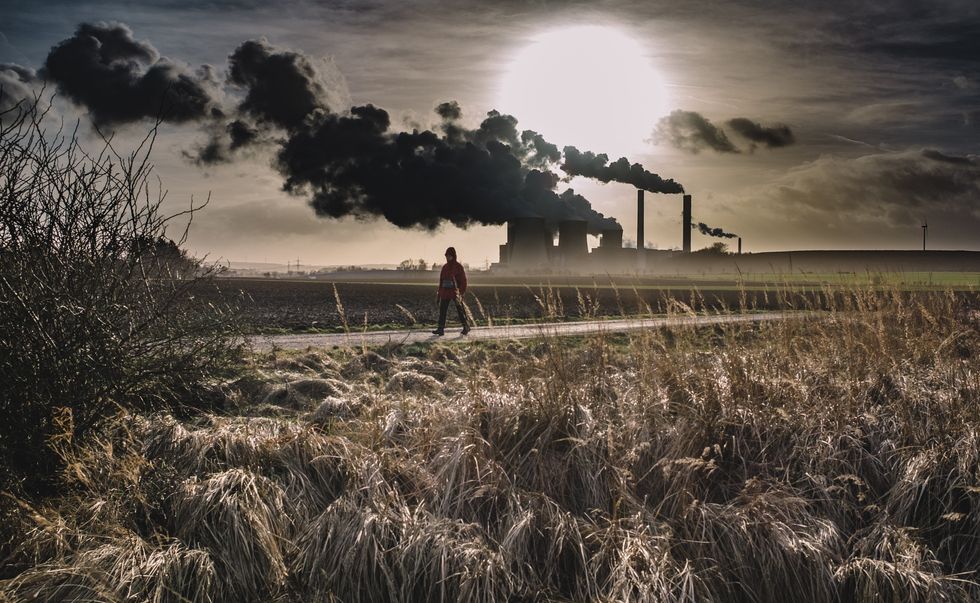Alexandria Ocasio-Cortez's political career to date can be summed up in four words: challenging the status quo. The progressive darling and Congresswoman-elect from New York's 14th District made waves this summer when she unseated the fourth-most powerful House Democrat in perhaps the biggest upset victory of 2018, setting the stage for a new wave of young progressives to enter office. However, when it comes to challenging the status quo, she clearly has no intention of stopping there.
As newly-elected members of the 116th Congress descended on Capitol Hill for "freshman orientation", Ocasio-Cortez joined over 200 young activists in protesting outside the office of presumptive Speaker of the House (and Rep.-elect Ocasio-Cortez's new boss), Nancy Pelosi.
Their demand? That in the face of catastrophic and irreversible climate change that some have described as "climate genocide", Democrats take a bold stand to avert disaster by embracing perhaps the single most important policy proposal currently being floated by the left: a Green New Deal.
What is the Green New Deal? Put simply, it is a far-reaching and fundamentally radical policy agenda that seeks to bridge the gap between climate justice and economic justice, which have historically been presented as opposing and mutually-exclusive priorities by politicians on both sides of the aisle, by attacking climate change at its roots—the economic structures and practices that have allowed it to reach crisis point.
An approach to climate change that draws a direct line between environmental sustainability and economic prosperity, rather than pitting the two issues against one another as politicians have done for decades, is the only solution to the climate crisis that operates on a sufficient scale to make a tangible difference, has broad enough support to be politically viable, and addresses the root causes of the crisis. Other "solutions"—which are extremely diluted in their power and rely on individual action to be the catalyst for change—not only fail to make a meaningful impact, but they actually accelerate the problem by reproducing the same neoliberal, free-market ideology with its focus on the individual as the base unit for social change that got us into this situation in the first place. Fortunately, the Green New Deal satisfies these criteria extremely well.
The exact laundry list of policy proposals vary, but Data for Progress has released a thorough and comprehensive plan for a Green New Deal that includes as just a few of its key points:
- 100% renewable energy by 2050 and zero net fossil fuel emissions by 2050
- 100% net-zero building energy standards by 2030
- Nationwide investment in water infrastructure to guarantee access to clean drinking water
- 40 million acres of public and private land reforested by 2035
- Sustainable agricultural practices reaching 30% by 2030 and 70% by 2050
The report goes on to describe in detail just how the Green New Deal will go about accomplishing these lofty goals, a process which in almost all cases involves severely pulling back on the free rein big corporations have been given to pursue profit at any and all environmental cost (and this free rein has been significant—today, just 100 companies account for 71 percent of the world's carbon emissions). What sets the Green New Deal apart, however, is the way it integrates these critical issues with similarly important economic discussions about infrastructure investment and job creation. Investing in the modernization and renewal of our nation's infrastructure is an issue of bipartisan support, with majorities in both parties supporting increased infrastructure spending. Advocates of a Green New Deal seek to leverage this support in a way that puts the United States on a path to genuine environmental sustainability, while also making the substantial investments in infrastructure that our nation so direly needs.
The Green New Deal's progressive benefits are felt even more acutely in the area of job creation, which the agenda addresses by integrating one of the most radical policy ideas that has recently gained traction among the progressive left—a green job guarantee. Such a program would, as its name implies, guarantee a job to anyone who wanted one, and under a Green New Deal, the jobs offered (or at least a substantial portion of them) would be explicitly designed to promote sustainability. The Data for Progress report offers a non-comprehensive list of nearly 30 different jobs, ranging from those that require minimal experience or training—such as wetland restoration, road, and bike lane construction, and waste removal and recycling—to those that will require more experience and education—such as installation of renewable energy systems, sustainable agriculture, and waste/wastewater treatment.
But the Green New Deal isn't just good policy—its policies enjoy broad popular support as part of a comprehensive climate-justice agenda, and in some cases are more popular when framed as part of a Green New Deal than when presented on their own. In the median state, stronger vehicle fuel efficiency standards enjoy 74 percent support, CO2 regulation has 71 percent support, and a renewable energy mandate has 64 percent support. A green job guarantee has 55 percent support and 18 percent opposition (compared to 23 percent when simply framed as a job guarantee).
Incrementalists who always rush to tap the brakes on progressive demands for bold climate justice often sound the refrain "we may have the capacity, but the political will just isn't there". This is a ridiculous argument. Political will doesn't just occur naturally—it is manufactured and shaped by those with control of the political and media institutions that determine the bounds of public discourse. When our so-called leaders bemoan the lack of political will to address climate change, the real problem is the lack of political courage necessary on their part to act swiftly and decisively to prevent humanity's imminent destruction.
Our elected officials had better find that courage, and soon—they may have votes to win, but without significant and immediate action, in the not-too-distant future, there may not be anyone left to cast a vote, for them or anyone else.























